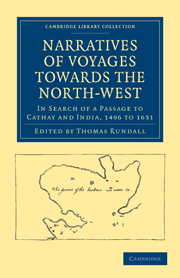 Narratives of Voyages Towards the North-West, in Search of a Passage to Cathay and India, 1496 to 1631
Narratives of Voyages Towards the North-West, in Search of a Passage to Cathay and India, 1496 to 1631 Book contents
- Frontmatter
- Contents
- Introduction
- Narratives
- SEBASTIAN CABOTA
- SIR MARTIN FROBISHER
- MASTER JOHN DAVIS
- CAPTAIN GEORGE WAYMOUTH
- MASTER JOHN KNIGHT
- MASTER HENRY HUDSON
- SIR THOMAS BUTTON
- JAMES HALL
- CAPTAIN GIBBONS
- BYLOT and BAFFIN
- CAPTAIN HAWKRIDGE
- CAPTAIN LUKE FOX
- CAPTAIN JAMES
- CONCLUSION
- APPENDIX: SUPPLEMENTARY NOTES
- POST-SCRIPTUM
- Plate section
- Frontmatter
- Contents
- Introduction
- Narratives
- SEBASTIAN CABOTA
- SIR MARTIN FROBISHER
- MASTER JOHN DAVIS
- CAPTAIN GEORGE WAYMOUTH
- MASTER JOHN KNIGHT
- MASTER HENRY HUDSON
- SIR THOMAS BUTTON
- JAMES HALL
- CAPTAIN GIBBONS
- BYLOT and BAFFIN
- CAPTAIN HAWKRIDGE
- CAPTAIN LUKE FOX
- CAPTAIN JAMES
- CONCLUSION
- APPENDIX: SUPPLEMENTARY NOTES
- POST-SCRIPTUM
- Plate section
Summary
James Hall, who had been employed by the King of Denmark in the years 1605, 1606, and 1607, was engaged in the year 1612 to take charge of an expedition which was promoted by a new association of English adventurers, that had been organized by Master Alderman Cockin. From remarks, however, that occur in the narrative, it would appear that the voyage was undertaken less for the purpose of discovering the North-west passage, than to take advantage of the reputed discovery, by the Danes, of mines, whether of gold or silver is not stated, on the west coast of Greenland.
The expedition consisted of two small vessels called The Patience and The Heart's Ease. When the started, is not apparent; but, on the 1st of July, they were in a place called Cockin's Sound. From thence they proceeded towards the river “where the supposed mine should be”. The weather, however, proving stormy, with the wind from the northward, they were constrained, on the 21st, to put into Ramelsford; and here the master, Hall, was slain by a savage: who, “with his darte, strooke him a deadly wound upon the right side”. The unfortunate man was the only person assailed; and he is supposed to have fallen a victim to revenge, from the fact of his having been associated, on a former visit, with the Danes : who, it is said, “out of that river carried away five of the people, whereof never any returned againe; and in the next river killed a great number”.
- Type
- Chapter
- Information
- Narratives of Voyages Towards the North-West, in Search of a Passage to Cathay and India, 1496 to 1631With Selections from the Early Records of the Honourable the East India Company and from Mss. in the British Museum, pp. 91 - 94Publisher: Cambridge University PressPrint publication year: 2010First published in: 1849
